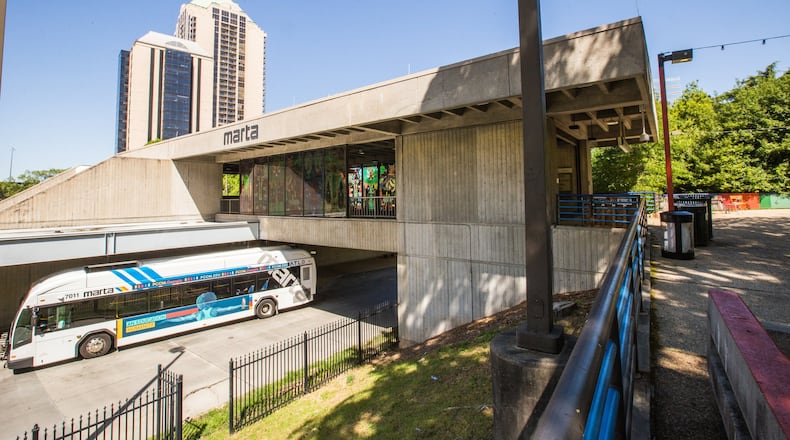MARTA will eliminate most of its 110 bus routes indefinitely and restrict service to 40 of its busiest and critical routes as the agency struggles with declining ridership and revenue amid the coronavirus outbreak.
The agency will add buses to 34 of the remaining routes and launch a circulator route. The changes begin Monday. MARTA says the new bus network will still serve 17 hospitals, 22 urgent care centers, 85 grocery stores and 16 job centers across Clayton, DeKalb and Fulton counties and the city of Atlanta.
The move comes as MARTA bus ridership has declined 40% during the pandemic, and plummeting farebox and sales tax revenue have left a $50 million hole in the agency's budget.
MARTA said eliminating most routes will allow it to double service on the remaining routes.
“This was not an easy decision,” CEO Jeffrey Parker said Thursday in announcing the moves. “I know it will have a negative impact on many bus-dependent areas, but it is necessary to keep MARTA operating and allow space on our busiest routes for customers to practice social distancing.”
MORE: A map of coronavirus cases in Georgia
MORE: Real-time stats and the latest news on the coronavirus outbreak
Sherry Williams, a transportation advocate who lives in southwest Atlanta, said she understands why MARTA cut service. But she hopes the agency will find other ways to serve residents who don’t own cars and rely on buses to get to the grocery store and medical appointments.
“Some of these people have to go to dialysis or, lord forbid, chemo treatments or radiation,” Williams said. “They have no options.”
Transit agencies took a big hit as schools and businesses closed and residents sheltered at home during the pandemic. Across metro Atlanta, Xpress bus and Cobb and Gwinnett counties have also reduced service as the number of passengers plummeted.
The pain has been felt across the state. On Thursday, Commissioner Russell McMurry told the State Transportation Board that 17 rural transit services have shut down completely.
MARTA — by far the state’s largest transit system — has been hard hit. In addition to the decline in bus passengers, train ridership is down nearly 80%. That means less money collected from passengers.
Sales tax revenue is also plunging at a time when expenses are rising. Last week the agency announced $500 bonuses for employees who can't work from home during the pandemic. That will cost the agency nearly $1.8 million.
The agency faces a $50 million gap between operating revenue and expenses that's expected to grow. MARTA says a $522 million federal bailout of Georgia transit agencies — MARTA will get about $298 million — will help, but it won't solve the agency's budget problems.
MARTA had already reduced the frequency of buses and trains as the pandemic worsened — trains are operating on a Sunday schedule during weekdays. Now it's eliminating many bus routes altogether for the foreseeable future.
The agency says it will boost service on the remaining routes. It also will add a circulator route on Oakley Industrial Boulevard that will service key destinations such as Clorox, Duracell and U.S. Food.
Despite the reduction in routes, the agency will not lay off bus drivers.
“This essential service plan will serve the largest number of people and, with these important destinations in mind, provide as much coverage in our service area as possible,” Parker said.
MARTA also is taking steps to ensure social distancing on buses, which on its busiest routes have been overcrowded at times. Signs will encourage riders not to board a bus that has no open seats. With beefed up service on the remaining routes, the agency says the next bus should come within 10 minutes.
MARTA says it will dispatch police officers to the busiest routes to address overcrowding. It says many passengers have ignored social-distancing guidelines.
Williams hopes MARTA will find other ways — perhaps an on-call service, neighborhood shuttles or less frequent service — to take care of passengers in areas where routes will be eliminated. She said many residents don’t own cars and can’t afford ride-hailing services.
“They can figure it out,” she said. “This is 2020. When the Great Depression happened, we didn’t have computers and cellphones.”
MARTA bus service
MARTA will eliminate most of its 110 bus routes for the foreseeable future, focusing service on 40 existing routes and one new one. For details, visit www.itsmarta.com.
About the Author
Keep Reading
The Latest
Featured




